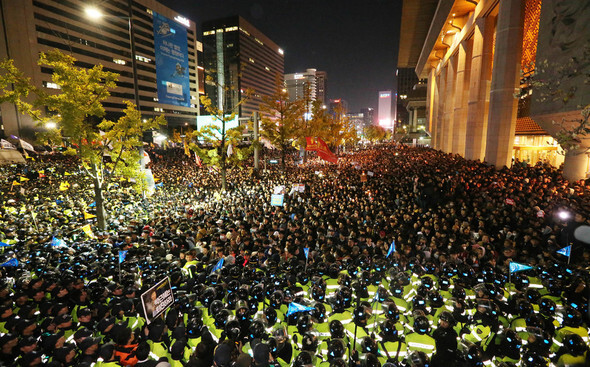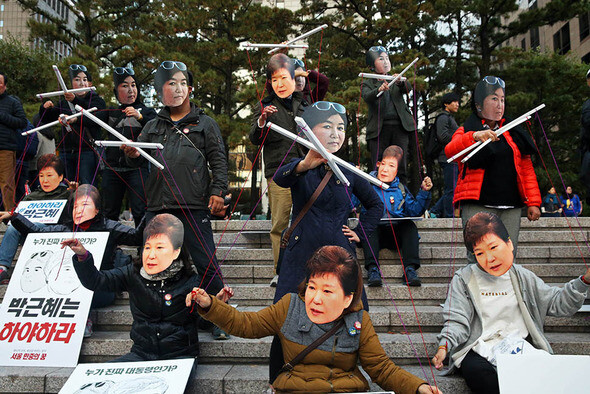hankyoreh
Links to other country sites 다른 나라 사이트 링크
[Column] The Choi Sun-sil scandal and the slavery of South Korea’s leadership class

As revelations continue to emerge about Choi Sun-sil’s corruption and her manipulation of the South Korean government, shock and anger are sweeping the country. Amid jokes about “The Republic of Choi Sun-sil” and frustration about the abysmal state of the government, children are calling for Park to step down or be impeached, and “emergency declarations” and protests are spreading like wildfire. The country almost seems to be on the verge of a revolution.
Choi Sun-sil’s shameless behavior is obviously bizarre. What is even more astounding is that her unethical, irregular and outright illegal acts were observed without any opposition for the past four years not only by the government, the ruling Saenuri Party and large conglomerates (and of course the Blue House) but also by schools and universities. How could this have happened?
Choi Sun-sil is frequently compared to Shin Don during the reign of King Gongmin of the Goryeo Dynasty or to Rasputin in Czarist Russia. But Shin Don and Rasputin were figures from feudal society, when the king and the state were the same thing. Choi Sun-sil is different from these figures in the sense that she appropriated the authority of the government in a democratic republic, in which sovereignty belongs to the people. The Choi Sun-sil scandal reveals that democracy in South Korea is not even at the level of a feudal monarchy.

Government ministers who were too eager jotting down Park’s every word to even debate her ideas, Blue House officials who were standing ready to serve her every beck and call, politicians in the Saenuri Party who submitted to Park’s seniority, chaebol who readily handed over billions of won at a single word from a person in power and professors who profited from kowtowing to inappropriate pressure - this is all the behavior of the slave groveling before its master. In this democratic republic, the members of the leadership class, it turns out, were all slaves to power.
Government ministers, chaebol, politicians, professors and other “slaves in the leadership class” all wield absolute authority over the organizations that are under their control. Just as they act like slaves to those above them, they are cruel taskmasters to those below them. The public servants, workers, party members and students under their control are forced to behave like slaves.
The servile mentality that cringes before power eventually manifests as a violent tendency to force others to submit. This is a typical example of the “authoritarian personality” described by Theodor Adorno. To be sure, these are cunning individuals who are obsequious when others are watching but who secretly connive with others to advance their own interests.
A society that is ruled by people with authoritarian personalities can never become democratic. Such people may proclaim a democratic republic, hold elections and espouse the rule of law, but all of that is only a facade. A society dominated by authoritarianism and a slave mentality is nothing but a slave democracy.
The parade of brazen lies made by the people ruling this country shows that they see the public as slaves. Lies are habitual to a master dealing with his slaves. For those who regard the public as slaves (or even as “dogs and pigs,” as Na Hyang-wook, a former Education Ministry official said), a lie is no big deal. Lying to slaves doesn’t even prick their conscience.
In a slave democracy, elections don’t guarantee real democracy, either. In reality, they’re just a formality in which the slaves vote for their new masters every four or five years.
The problem is not Choi Sun-sil but democracy. This scandal must be taken as an opportunity to bring about a qualitative improvement in South Korean democracy. South Koreans must move from nominal democracy to legitimate democracy, from democratic slavery to democratic sovereignty.
The Choi Sun-sil scandal has made constitutional reform even more necessary. Now is the time for a serious discussion to begin about how the people can assume real ownership of the government. If the sole focus is put on the presidential election procedures and no attention is paid to extending the people’s rights, the constitutional reform will be seen as nothing but a stratagem by vested interests to perpetuate the people’s slavery. The entire debate about revising the constitution must be focused on strengthening popular sovereignty.
By Kim Nu-ri, professor of German studies at Joongang University
Please direct questions or comments to [english@hani.co.kr]

Editorial・opinion
![[Column] Has Korea, too, crossed the Rubicon on China? [Column] Has Korea, too, crossed the Rubicon on China?](https://flexible.img.hani.co.kr/flexible/normal/500/300/imgdb/original/2024/0419/9317135153409185.jpg) [Column] Has Korea, too, crossed the Rubicon on China?
[Column] Has Korea, too, crossed the Rubicon on China?![[Correspondent’s column] In Japan’s alliance with US, echoes of its past alliances with UK [Correspondent’s column] In Japan’s alliance with US, echoes of its past alliances with UK](https://flexible.img.hani.co.kr/flexible/normal/500/300/imgdb/original/2024/0419/2317135166563519.jpg) [Correspondent’s column] In Japan’s alliance with US, echoes of its past alliances with UK
[Correspondent’s column] In Japan’s alliance with US, echoes of its past alliances with UK- [Editorial] Does Yoon think the Korean public is wrong?
- [Editorial] As it bolsters its alliance with US, Japan must be accountable for past
- [Guest essay] Amending the Constitution is Yoon’s key to leaving office in public’s good graces
- [Editorial] 10 years on, lessons of Sewol tragedy must never be forgotten
- [Column] A death blow to Korea’s prosecutor politics
- [Correspondent’s column] The US and the end of Japanese pacifism
- [Guest essay] How Korea turned its trainee doctors into monsters
- [Guest essay] As someone who helped forge Seoul-Moscow ties, their status today troubles me
Most viewed articles
- 1[Column] The clock is ticking for Korea’s first lady
- 2After 2 months of delayed, denied medical care, Koreans worry worst may be yet to come
- 3US overtakes China as Korea’s top export market, prompting trade sanction jitters
- 4[Column] Has Korea, too, crossed the Rubicon on China?
- 5[Correspondent’s column] In Japan’s alliance with US, echoes of its past alliances with UK
- 6Hong Se-hwa, voice for tolerance whose memoir of exile touched a chord, dies at 76
- 7[Editorial] When the choice is kids or career, Korea will never overcome birth rate woes
- 8Samsung barricades office as unionized workers strike for better conditions
- 9All eyes on Xiaomi after it pulls off EV that Apple couldn’t
- 10More South Koreans, particularly the young, are leaving their religions